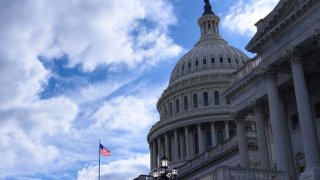
The US Capitol is seen in Washington, DC, on October 28, 2021. – US President Joe Biden announced a “historic” framework Thursday for spending $3 trillion on America’s social safety net and crumbling infrastructure, but his claim to be on the cusp of a major political victory had yet to get full backing from Democrats. Two conservative Democratic senators who have held up the social spending component, calling it too expensive, Joe Manchin and Kyrsten Sinema, sounded positive but did not commit to supporting Biden’s framework. (Photo by MANDEL NGAN / AFP) (Photo by MANDEL NGAN/AFP via Getty Images)
The political divide in American is wide. Assessing just how wide is the goal of a new index introduced by the USC Anneberg School for Communication and Journalism.
The polarization index is a science-based database tracking national political division as measured with social media conversations. The polarization index mathematically calculates the degree of discord across 10 keys issues using a real-time natural language processing.
The index was created In collaboration with PR firm Golin and narrative intelligence company Zignal Labs.
"It's clear from our analysis that polarization has become a permanent fixture in American culture, fueled in part by partisan communicators in media and politics who benefit from conflict,'' Fred Cook, director of the USC Center for Public Relations at the Annenberg School for Communication and Journalism, said in a release. "These opposing political forces are using the issue of immigration as the foundation for building a wall to divide our country.''
Get Southern California news, weather forecasts and entertainment stories to your inbox. Sign up for NBC LA newsletters.
Immigration is the top issue contributing to the high level of polarization in the country, according to a release from USC. The polarization index indicates that immigration discussions have grown more contentious since last year's presidential election, and it is largely driven by engagement with right-leaning media featuring a high level of unreliable information.
"Polarization is a complex, dynamic, and widespread phenomenon of huge import for CEOs who increasingly find their companies embroiled in whether to take a stance,'' Guy Churchward, CEO of Zignal Labs, said in a release. "Using real-time technology, we can quantify the degree of polarization of given narratives, track this over time, and provide a framework for business and government leaders, as well as the media itself, to assess the dangers and opportunities that these topics pose.''
Policing policy ranks second, racial equity ranks third and gun legislation ranks fourth, according to recent data in the polarization index. Social media users on the left and right contributed in roughly equal numbers to the discussions on racial equity and gun legislation, an indication they will remain polarizing topics for the foreseeable future.
Local
Get Los Angeles's latest local news on crime, entertainment, weather, schools, COVID, cost of living and more. Here's your go-to source for today's LA news.
"When we look at polarization as a quantified entity, we see how powerful echo chambers are being created and amplified, reinforcing existing opinions,'' Jonny Bentwood, Global Head of Data and Analytics at Golin, said in a release. ``By tracking these trends over time, we gain useful insights into how consumer perceptions evolve on issues that impact society and business.''
The USC Polarization Index can be downloaded at ThePolarizationIndex.com and updates will be released periodically.